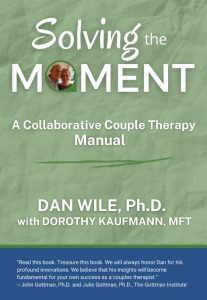I was asked to describe my couple therapy approach first in two sentences, then as a paragraph, and finally as a set of principles. When I showed what I wrote to colleagues, some asked if they could revise it to fit their approach and show it to the couples in their practice. If any of you wish to do the same, I’d love to get a copy of your revision.
Two-sentence description: Fighting and withdrawing are inevitable in a couple relationship, but partners can become increasingly skillful in reducing their frequency, duration, and damage, and even turning them into opportunities. In couple therapy, I speak for partners, translating their fighting or withdrawing into intimate conversations.
Paragraph description: The quality of life in a relationship depends on the couple’s ability to cope with their inevitable periods of fighting (quietly or loudly) and withdrawing (not talking about what mainly concerns them). Couples typically come to a therapy session in the midst of one of these two states. In either case, I move next to one of you and speak as if I were that person talking to the other. If you are fighting, I attempt to translate your angry and defensive comments into confiding ones. If you are withdrawing—that is, not talking about your feelings—I speculate about what these feelings might be and ask if my guess is correct. My goal is to turn fights or withdrawal into intimate conversations—to turn what is endangering the relationship into a means for deepening it.
A set of principles:
- In addition to whatever specific issues you both are struggling with (money, sex, children, inlaws), there is generally the added and often more significant problem of how you talk—or don’t talk—about these issues: you fight or withdraw.
- Fighting is a deadlocked exchange in which each partner feels too unheard to listen, too misunderstood to be understanding, and too stung by what the other just said to do anything other than sting back.
- Withdrawing is a devitalized exchange in which partners don’t talk about what most concerns them and may not talk much at all.
- Intimacy, the alternative to fighting and withdrawing, occurs when partners confide to each other the main things on their minds—what’s “alive” for them at the moment, to use Marshall Rosenberg’s term—in a way that works out, that is, that leaves each feeling closer rather than hurt, angry, defensive, or distant.
- Intimacy, this alternative to fighting and withdrawing, can be created by the way partners recover from fighting or withdrawing, that is, by means of a recovery conversation in which, unlike the fight or withdrawal, you confide feelings, make acknowledgments, reach out to the other, and look at things from the other’s point of view.
- In such a conversation, you create a meta-level, a bird’s eye view, a perch, a helicopter look at the traffic, a vantage point above the fray, a platform. You operate as joint troubleshooters talking in a dispassionate, compassionate, and intimate way about your fighting, withdrawing, and lack of intimacy. You develop a shared picture of your relationship—how it is special as well as its trouble spots.
- Every couple has its own set of unsolvable problems that they grapple with throughout the relationship. Creating a platform—operating as joint troubleshooters—is the premier way to deal with such problems. Operating as troubleshooters, you commiserate over your unsolvable problems and put them in perspective.
- In couple therapy, I translate the partners’ fights and withdrawals into conversations. I show them how to construct a platform from which to hold recovery conversations that enable them to turn problems into occasions for intimacy—to turn what is endangering the relationship into a means for deepening it.



Dan: Your two summaries are wonderful. They are very close to what I do and have found to work, but you say things so clearly and in language that is easily understood. In writing my own book on Couple Therapy, I have been most influenced by your sage theorizing, clarity of thought, and practical examples of your actual work. Keep up the good work!!
Best wishes,
Art
I LOVE it……… again………. It is a great distillation of all you’ve taught me over the years. Again, worthy of being a ‘yellow sticky’ in my mind.
Thank you………Lynn
I haven’t revised it yet, but I have already given it to several couples (with credit to Dan). I found it very helpful, both in clarifying what I do and in helping them think about what they can do. It seemed to move things forward.
Thanks, Dan!
Susan
With respect to the phrase “devitalized exchange,” Dan,in your 3rd principle, I’m struck by the certainty that in any couple (or even friendship) there can’t but be an occasional devitalization, at least a momentary one, so that intimacy and withdrawal are a kind of inevitable dialectic–with which there is nothing wrong? Which is not to say that one doesn’t work at the avoidance of withdrawal and cultivation of intimacy. You’re very helpful, of course. Gerhard
Yes, Gerhard, you caught the main oversimplification or misstatement in my piece. It’s as you say. Much–maybe most–of the time we and our partners aren’t talking with each other about the main things on our minds–and for a variety of reasons: we are ashamed of them, concerned how our partners might respond, afraid they might be hurtful, tired, preoccupied, irritated. Lots of times we don’t know or can’t verbalize the main things on our minds. A certain amount of devitalized exchange is inevitable, unavoidable, and normal. I consider it an unusually intimate relationship if on any given day we confide a few important things.
I, too, loved your summaries. It would feel slightly more complete to me were the lst sentence of the two-sentence description to include at the end (following a comma) “thereby assisting partners in finding their respective voices.”
Best wishes, Dan. I hope you come to Portland again.
Dave